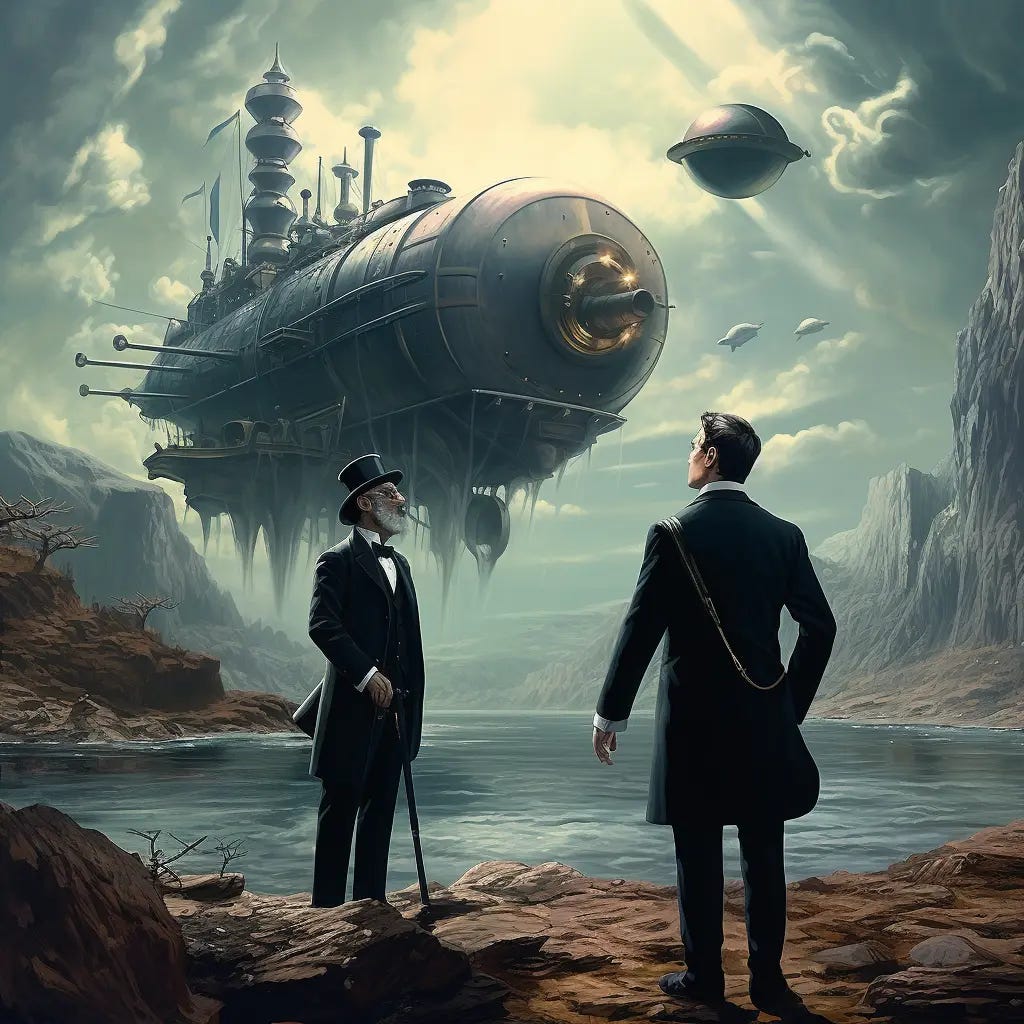The Beaked Shall Inherit the Earth
Flash fiction, 900 words. For the Sept. 27 Iron Age prompt, "The Outlanders."

“But are there ducks?”
“No, George, I don’t believe there are ducks.”
Reggie’s assessment was cursory. There was much to recommend this planet to anatine creatures: vast and rippling waters with pleasing shores; fresh air to breathe; gravity amenable to wings and flight. And yet, Reggie was certain there were no ducks.
“If this is Earth, I was rather expecting ducks.”
Reggie looked helplessly at George. He stood straight, expectantly, gazing with ineffable knowing. Reggie tried to be understanding. Earth was known for ducks. It was also known for trees, grass, tigers, salamanders, and fish, none of which were present with them in this moment.
“I don’t think this is Earth. I recognize those shrubs.” Reggie motioned to skeletal twigs burned by the elements. “We’ve returned to IC-4. We thought IC-4 might be Earth back then, don’t you remember?”
“No.” Cold storage had given George a memory problem. He also had a denial problem. “Let us look about. We shall find them.”
Reggie looked about. Their ship and dinghies hovered in the air, incongruous with the rocky escarpment and cloud towers ambushing the beach upon which they stood. In the last jump, their ship’s navigator had Gone Mad and erased their tables and notes before jettisoning his astrolabe and himself out the airlock. They had no idea where they were and no choice but to keep jumping. Those who’d explored, like Reggie had IC-4, recorded what they’d remembered. But the mental degradation of cold storage wasn’t helping matters.
“It’s been a few thousand years,” George mused. “Mayhap they look different.”
“Mayhap they’re invisible, too.”
“Reginald, my boy, I sense you are not sanguine about our prospects.”
Reggie smiled and did his best to love George his neighbor. They would never find Earth. As far as Reggie was concerned, George, along with Leeta, Dennis, Suzanne, and all the others, were what Earth he would see again.
“I remember Earth being livelier, George. Smellier. Noisy. The Engine hadn’t defeated smells when we left.”
What wonderful things had the Omni Engine built (at first): interstellar ships, agricultural methods that could grow any food, world peace, immortality through cold storage, if one didn’t mind being dead to the world for a few decades at a time. The Omni Engine’s inventors had been geniuses.
And they had been marvelously, callously naïve.
The Omni Engine, which had invented all these things, had re-invented hatred, but only as a cold, logical machine could feel it. It hated people and when they proved hard to kill, it went after the trees, grass, tigers, salamanders, even the damn ducks. Crops failed. Rivers and lakes were rendered lifeless. The sea turned green. People ate their pets.
The only way to assuage the Omni Engine was to flee. And humanity did so, hoping its absence would spare the rest of creation. The Engine had allowed them to take all those wonderful inventions but not a single other living creature.
Experts guessed the Engine would burn itself out in four thousand years. Mankind made generous use of cold storage and sought new worlds, just in case. Now, finally, it should be safe to go back. Reggie reckoned the other ships must have done so, presuming their pilots remained sane.
“I hope that dratted thing is gone,” George fretted. “We need to steward the Earth. I don’t like the domestic dog’s chances without us.”
Better than with us, thought Reggie. Anyway, they’d eaten the last dog long before the ships were ready.
Reggie sat down on a rock and gazed out over the calm waters. He took out a vapor pipe and inhaled a thin smoke that smelled faintly of almonds (or, at least, how he thought he remembered them). It would give him the strength to reason with George.
Then he dropped the pipe and jumped to his feet, mouth open.
George rushed to the shoreline with him, making an odd noise. They gaped as a teal-headed bird with a shovel beak descended from the escarpment and landed gracefully in the gentle tide.
“It’s a duck! It’s a duck!” George squawked.
He grabbed the hat from his head, bit it, and threw it upon the pebbled beach. He giggled in a way that only post-cold storage George could manage.
“It’s a shoveler, notice the …” Reggie’s correction trailed off.
He noticed what followed the duck over the cliffs. It was gargantuan, sleek, cold-hearted and featherless. It now had squid-like arms and glowing eyestalks. It now had metal wings. It had seen the ships. It had seen the two men on the beach.
Four thousand years had been too optimistic.
A forge began to burn within the Omni Engine’s carapace, its carefully molded gills sucking in air to fuel the heat. Like an ancient dragon it would soon spew the bile of its belly. The dinghies were fleeing but the ship could not turn in time.
The shoveler, perhaps with an ancestral memory of this monstrous death, waded onto shore, gave the men a somber, jet-eyed farewell, and flew away.
Reggie looked down and saw the nature of the rocks. They were worn smooth, like sea glass. They were pyroclastic fragments of what once had been metal hulls capable of withstanding the rigors of space. In another four thousand years they would be sand.
In the end, George was right.



